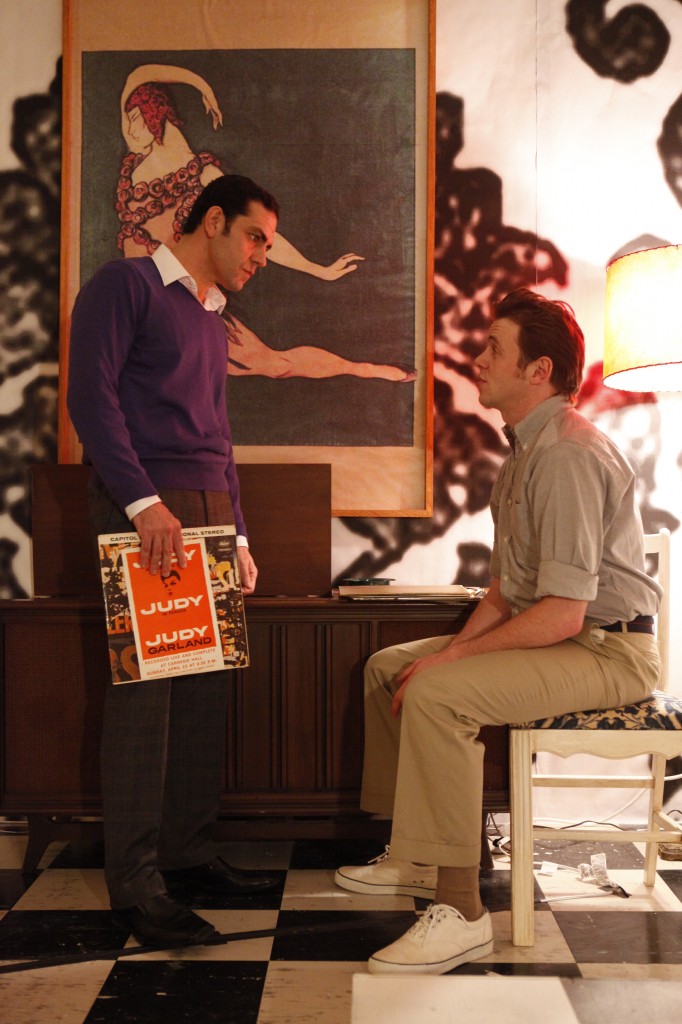 There will undoubtedly come a time when Mart Crowley’s “The Boys in the Band†reaches the point of no return – that would be the point when a play gets so old that it becomes impossible to separate it from the past, so that audiences have to see through time in order to appreciate the drama. You’d think that after being around for over 40 years, that point would at least be somewhere on the horizon, but this revival by the Transport Group in New York stays true to the immortality at its center, overlooking its legacy to find its character. It remembers why this material was such a big deal to start with.
There will undoubtedly come a time when Mart Crowley’s “The Boys in the Band†reaches the point of no return – that would be the point when a play gets so old that it becomes impossible to separate it from the past, so that audiences have to see through time in order to appreciate the drama. You’d think that after being around for over 40 years, that point would at least be somewhere on the horizon, but this revival by the Transport Group in New York stays true to the immortality at its center, overlooking its legacy to find its character. It remembers why this material was such a big deal to start with.
Having a bunch of actors onboard who can live up to all that hype helps. Considering the fact that Crowley’s working with nine characters, he can only give them so much depth in two hours. A play like this requires everyone to do his part to provide these characters with the gravity they need, especially one that deals more with drama than plot. On top of being able to make their own characters work, all of the actors here understand how they behave around one another, and why the tension between them erupts the way it does.
Because almost all of the characters here are gay, the one who claims he’s not is kind of the odd man out. We’re never really sure why Alan’s (Kevin Isola) marriage is on the rocks, but when he calls his friend Michael (Jonathan Hammond) and tells him he wants to see him right away, Michael suspects that he probably left his wife because he’s in the closet. He tells Alan that he’ll have to wait until tomorrow before they can meet, since he’s still getting things ready for his friend Harold’s (Jon Levenson) birthday party tonight.
Michael expects the usual suspects to be there: His literate confidante and better half, Donald (Nick Westrate); Larry (Christopher Innvar) and Hank (Graham Rowat), two roommates who are more than just friends; a black guy named Bernard (Kevyn Morrow), who has to put up with Michael’s fondness for racist jokes; and Emory (John Wellmann), a delicate flower who’s about as feminine as it gets. As if the guest list wasn’t full enough already, Michael doesn’t know what to do when Alan shows up out of the blue with a quizzical look on his face.
They’ve brought gifts, but since Larry’s the kind of guy who’d show up for his own party stoned, Emory’s is probably the most appropriate: A muscle-bound gigolo (Aaron Sharff) who’s dressed as a cowboy. Though the other guests engage in conversations that are too clever for him to keep up with, given the hostility that Michael unloads on them, anyone who’s not involved might well be better off.
It’s hard enough for a dark comedy to pull off laughs that work as well as the drama, but this one ups the ante by handling both of them at once. A great deal of its witticisms have stings in their tails, even when somebody quotes a favorite Bette Davis movie or Tennessee Williams play. Although there’s no shortage of dramatic moments here, the actors have a lively way of approaching them, resulting in melodrama with the rhythms of a screwball comedy. In fact, there’s a sense that they’ve seen so many old movies that they stole most of their quirks from them. (The characters, not the actors.)
Even the set design has its own strange chemistry. The vintage posters up on the wall and the turntable that blasts Judy Garland give everything an atmosphere that’s pretty intimate, so much so that you can’t help but feel uncomfortable seeing how everyone here behaves behind closed doors. Since this is one of those productions that places the audience in the round, it makes sense that some of the characters would wind up against the wall with us – they make us feel the same tension that they feel around each other whenever they turn up in our demesne, particularly with a host who’s as intoxicated as Michael is. That’s what comes from too much pills and liquor.

Leave a Reply